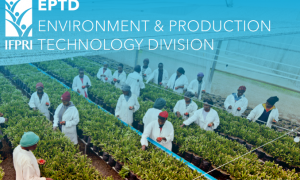EPTD identifies ways to combine appropriate and affordable food and agricultural technologies with supportive policies, institutions, and investments.
Search
Achieving food and nutrition security is a complex challenge. This is especially true in South Asia, where 40 percent of the world’s poor—who survive on less than US$1.25 a day—live and 21 percent of the population is undernourished.
MTID provides innovative, evidence-based policy solutions to help drive inclusive economic growth, reduce poverty, and ensure food security worldwide through a more efficient food system.
Poverty, food insecurity, and poor nutrition and health are among the most pernicious problems eroding people’s quality of life and limiting their economic productivity.
DSGD engages in rigorous, policy-relevant research, outreach, and capacity strengthening to promote sustainable and socially inclusive rural development.
IFPRI established the West and Central Africa office (WCAO) in 2010 to better meet local research and capacity needs for Reducing poverty and ending malnutrition in the region.
Our research aims to improve nutrition by understanding and addressing both the direct determinants of malnutrition (such as diets, caregiving and feeding practices, and health) and the underlying contributors (such as income, food security, educa






